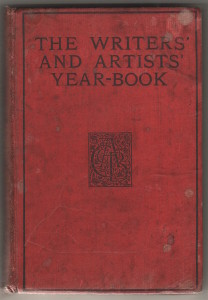 In the year in which the UK edition of The Waste Land was published, as well as novels by Lawrence, Wells and Huxley, comes this copy of The Writers and Artists Year-book. Evidently owned by a lady who wished to make money from her writing, the blank pages at the back of this book devoted to a record of contributions includes mostly household and beauty tips, such as ‘ Dangers in the Kitchen ‘ ,‘To Clean Hats ‘, ‘ My Great Grandmother’s Beauty Tips’, and ‘Adulterated or Not ‘, all of which were accepted. However, it seems as if this writer was also concerned with the role of women in society; she sent an article entitled ‘Women as Prison Wardresses’ to the Yorkshire Post, which though it was not published there, was re-sent to the Yorkshire Evening Post, where it appeared in May 1923 in the ‘Work for Woman’ series as ‘The Prison Wardress’. Other magazines to which she sent feature articles include Farm, Field and Fireside, Pearson’s and the Westminster Gazette.
In the year in which the UK edition of The Waste Land was published, as well as novels by Lawrence, Wells and Huxley, comes this copy of The Writers and Artists Year-book. Evidently owned by a lady who wished to make money from her writing, the blank pages at the back of this book devoted to a record of contributions includes mostly household and beauty tips, such as ‘ Dangers in the Kitchen ‘ ,‘To Clean Hats ‘, ‘ My Great Grandmother’s Beauty Tips’, and ‘Adulterated or Not ‘, all of which were accepted. However, it seems as if this writer was also concerned with the role of women in society; she sent an article entitled ‘Women as Prison Wardresses’ to the Yorkshire Post, which though it was not published there, was re-sent to the Yorkshire Evening Post, where it appeared in May 1923 in the ‘Work for Woman’ series as ‘The Prison Wardress’. Other magazines to which she sent feature articles include Farm, Field and Fireside, Pearson’s and the Westminster Gazette.
Our freelance journalist also appears to have been interested in contributing verse. In the section covering ‘ Magazines and Journals’ she has underlined in pencil references to ‘ verse ‘ , ‘ humorous verse’ or ‘ poems’ in the Times (really?), the Prize, Lady’s World, Ideas, Humourist, Home Notes, Graphic, Colour, Chummy Book Annual, Children’s Companion, Boys’ Own Paper, among other periodicals. There are pencil marks next to the names of various American periodicals, too.
Glancing through this section of the Year-Book, it is fascinating to discover who was editing which periodical in 1923. The influential literary critic Sir William Robertson Nicoll was in charge of the Bookman (1891),The Brain was edited by the aptly named Dr Henry Head ( later succeeded by Dr Brain ), J. M. Keynes edited The Economic Journal, Form, a magazine devoted to ‘ art, literature and music’ had Austin O. Spare as one of its co-editors, the Glasgow News was conducted by the novelist Neil Munro, the rabidly Tory Morning Post, where the acclaimed poet and critic Geoffrey Grigson cut his teeth, by the rebarbative H.A Gwynne, the New Witness by G.K. Chesterton, Toby ( a children’s magazine ) by G. Heath Robinson, brother of the famous cartoonist, and the Sunday Evening Telegraph by the controversial Horatio Bottomley.
Of all the information supplied by editors to potential contributors, this from Miss Dew, who conducted Dainty Novels, is particularly revealing :
‘….Pathetic stories preferred, but very strong love interest is essential. Everything must be suitable for young girls to read. Scenes should be laid amongst middle-class people, not the industrial or aristocratic classes…’
[R.M.H]
